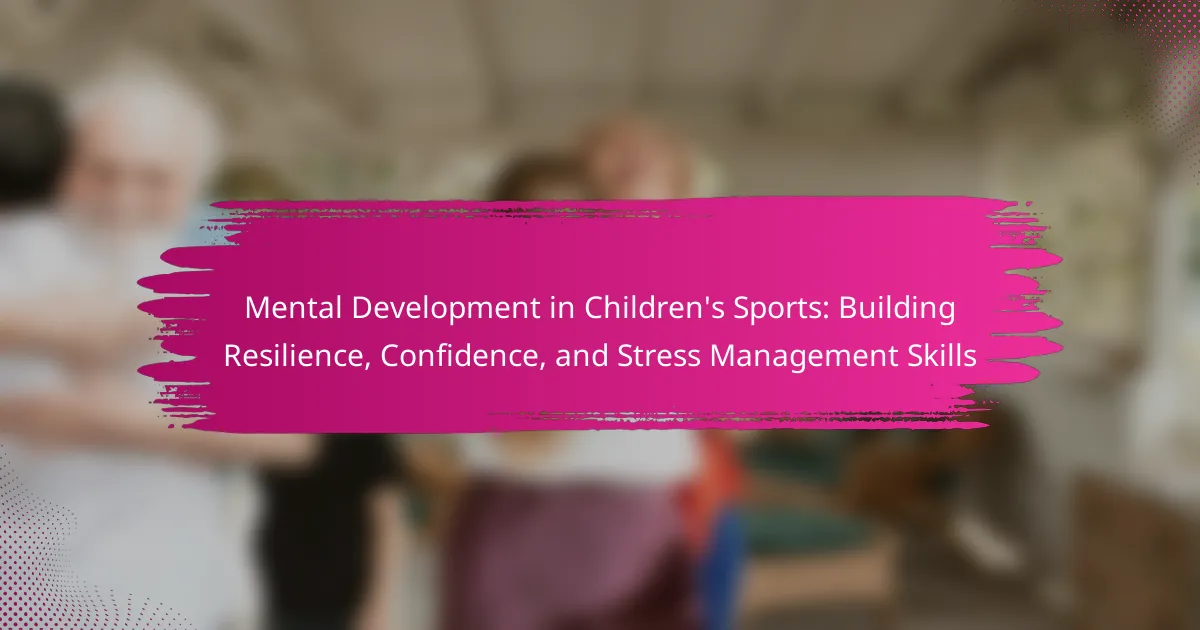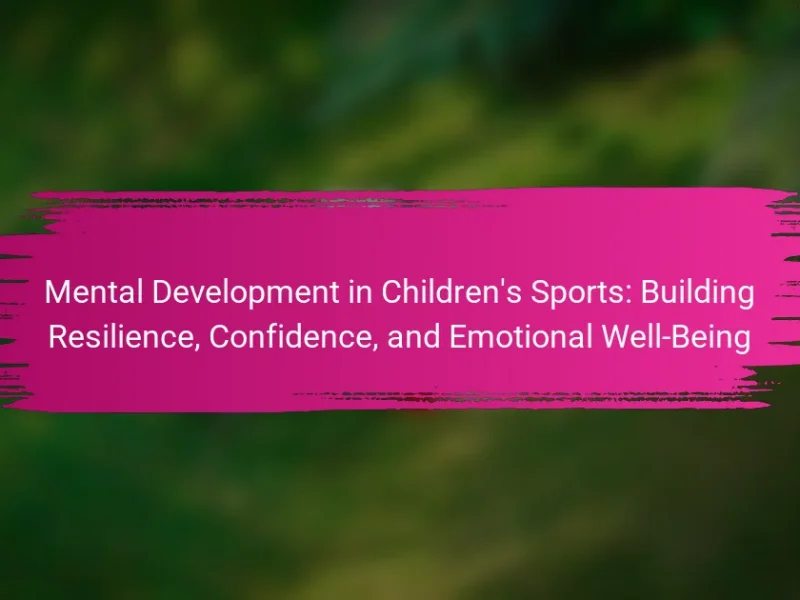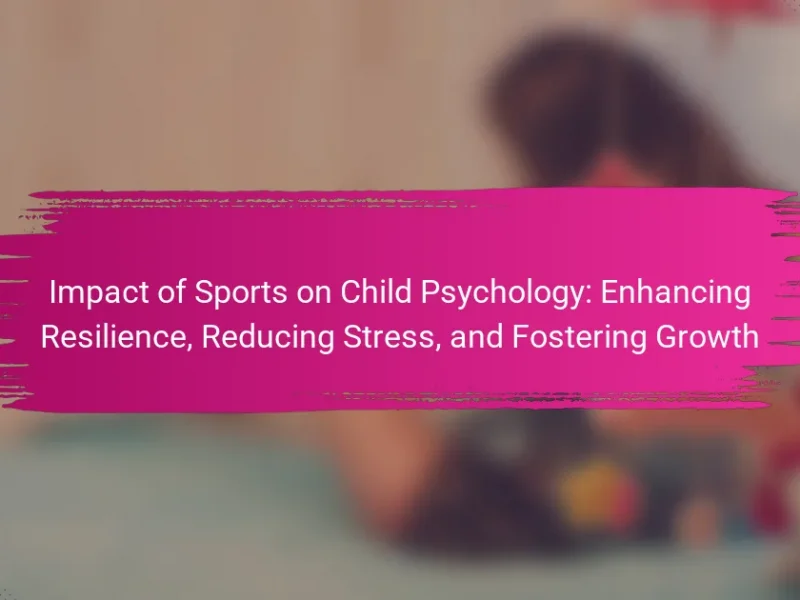Mental development in children’s sports is crucial for building resilience, confidence, and effective stress management skills. Young athletes learn to cope with challenges, enhancing their performance under pressure. By integrating mental training, coaches can foster these essential attributes, leading to improved overall development. Parents also play a key role by encouraging a growth mindset and creating supportive environments that promote emotional well-being.

How does mental development influence resilience in young athletes?
Mental development significantly enhances resilience in young athletes by fostering coping mechanisms and confidence. As children learn to manage stress, they develop a growth mindset that enables them to overcome challenges. This psychological growth leads to improved performance under pressure. Research indicates that athletes with strong mental skills demonstrate higher resilience, allowing them to bounce back from setbacks more effectively. By integrating mental training into sports programs, coaches can cultivate these essential attributes, ultimately benefiting young athletes’ overall development and success.
What are the key components of resilience in children’s sports?
Key components of resilience in children’s sports include mental toughness, emotional regulation, social support, and goal-setting. Mental toughness allows children to overcome challenges and maintain focus. Emotional regulation helps them manage stress and anxiety during competition. Social support from coaches and peers fosters a sense of belonging, enhancing motivation. Goal-setting encourages persistence and a growth mindset, essential for long-term development.
How can coaches foster resilience in young athletes?
Coaches can foster resilience in young athletes by promoting a growth mindset and encouraging perseverance. They should create a supportive environment that allows for mistakes, emphasizing learning from failures. Regularly setting achievable goals builds confidence and teaches athletes to handle challenges. Additionally, incorporating mental skills training, such as visualization and positive self-talk, enhances stress management. Engaging athletes in reflective practices helps them understand their emotions and responses, further strengthening their resilience.
What strategies can be employed to build resilience?
To build resilience in children through sports, employ strategies like fostering a growth mindset, encouraging goal-setting, and teaching coping skills. These methods enhance mental development and equip children to handle challenges effectively.
Encourage a growth mindset by praising effort over innate ability, promoting the idea that skills can improve through practice. This mindset empowers children to embrace challenges and learn from failures.
Set specific, achievable goals to provide children with a sense of direction and accomplishment. This practice builds confidence and motivates them to persevere through difficulties.
Teach coping skills such as deep breathing and positive self-talk to help children manage stress and anxiety during competitions. These techniques enable them to remain focused and composed under pressure.

What role does confidence play in children’s sports performance?
Confidence significantly enhances children’s sports performance by fostering resilience and effective stress management. When children believe in their abilities, they are more likely to take risks, persist through challenges, and recover from setbacks. This positive mindset directly influences their motivation and engagement in sports activities. Studies indicate that confident athletes demonstrate improved focus and decision-making during competitions, leading to better overall performance. Additionally, confidence is a unique attribute that can be nurtured through positive reinforcement, skill mastery, and supportive coaching, ultimately contributing to a child’s mental development in sports.
How can confidence impact a child’s sporting experience?
Confidence significantly enhances a child’s sporting experience by promoting enjoyment and participation. When children feel confident, they are more likely to engage in sports activities, take risks, and learn new skills. This positive mindset fosters resilience, enabling them to cope with challenges and setbacks. Research indicates that children with higher confidence levels are more likely to persist in sports despite difficulties, enhancing their overall mental development. Additionally, confidence contributes to stress management, allowing children to handle competitive pressures effectively.
What practices enhance confidence in young athletes?
Encouraging practices that enhance confidence in young athletes include positive reinforcement, goal-setting, and skill mastery. Positive reinforcement boosts self-esteem through praise and recognition. Setting achievable goals fosters a sense of accomplishment. Mastering skills builds competence, further enhancing confidence. Regular feedback and a supportive environment also play crucial roles in this development.
What are effective confidence-building exercises?
Effective confidence-building exercises for children in sports include positive reinforcement, setting achievable goals, and visualization techniques. These methods help develop resilience and manage stress effectively.
1. Positive Reinforcement: Acknowledge and reward effort and progress to boost self-esteem.
2. Setting Achievable Goals: Establish clear, measurable objectives to foster a sense of accomplishment.
3. Visualization Techniques: Encourage children to imagine successful performances to enhance confidence.
These exercises promote mental development and emotional well-being in young athletes.

How can stress management techniques benefit child athletes?
Stress management techniques significantly benefit child athletes by enhancing their mental resilience and confidence. These techniques help children cope with competitive pressures, leading to improved performance and overall well-being. Research indicates that regular practice of stress management, such as mindfulness and deep breathing, can reduce anxiety levels in young athletes. Additionally, fostering these skills early on builds a foundation for lifelong mental health. As a result, child athletes develop a unique ability to handle stress, which can positively impact their sports experience and personal growth.
What are common stressors faced by young athletes?
Young athletes commonly face stressors such as performance pressure, balancing academics and sports, and social expectations. These stressors can impact their mental development and resilience.
Performance pressure arises from the desire to excel, often fueled by coaches, parents, and peers. Balancing academics and sports creates time management challenges, leading to stress. Social expectations can stem from the need to fit in or maintain relationships, adding to their emotional burden.
These stressors can hinder confidence and coping skills. Developing effective stress management techniques is crucial for young athletes to foster resilience and maintain mental well-being.
How can parents support stress management in sports?
Parents can support stress management in sports by fostering open communication, promoting a balanced lifestyle, and encouraging a growth mindset. Open discussions about feelings help children express stressors. A balanced lifestyle, including adequate rest and nutrition, enhances overall well-being. Encouraging a growth mindset allows children to view challenges as opportunities for learning, which builds resilience. Additionally, modeling healthy coping strategies, such as mindfulness and relaxation techniques, equips children with tools to manage stress effectively.
What tools can children use to manage stress effectively?
Children can effectively manage stress using tools such as mindfulness, physical activity, and creative expression. Mindfulness techniques, like deep breathing or meditation, help children focus and calm their minds. Engaging in physical activities, such as sports or dance, releases endorphins and reduces anxiety. Creative expression through art, music, or writing allows children to process their feelings and emotions. These tools build resilience and confidence, essential for mental development in children.

What universal attributes contribute to mental development in sports?
Mental development in sports is influenced by attributes such as resilience, confidence, and stress management skills. These universal attributes foster emotional growth and adaptability in children. Resilience enables young athletes to recover from setbacks, enhancing their ability to face challenges. Confidence builds self-esteem, encouraging them to take risks and improve performance. Stress management skills equip children to handle competitive pressures, promoting mental well-being. Together, these attributes create a holistic framework for mental development in youth sports.
How do teamwork and social interactions influence mental growth?
Teamwork and social interactions significantly enhance mental growth in children involved in sports. Engaging with peers fosters resilience, as children learn to navigate challenges together. This collaborative environment builds confidence, encouraging them to take risks and embrace new experiences. Furthermore, social interactions teach stress management skills, helping children develop coping strategies during competitive situations. Overall, these dynamics contribute to a well-rounded mental development essential for lifelong success.
What role does physical fitness play in mental development?
Physical fitness significantly enhances mental development in children by fostering resilience, confidence, and stress management skills. Engaging in sports promotes a growth mindset, allowing children to overcome challenges and setbacks. Regular physical activity increases dopamine levels, which improves mood and cognitive function. Moreover, teamwork and competition in sports teach children valuable social skills, further contributing to their emotional intelligence. Studies show that physically active children exhibit better focus and academic performance, highlighting the integral link between fitness and mental growth.

What unique attributes differentiate successful young athletes?
Successful young athletes exhibit unique attributes that set them apart, including mental resilience, self-confidence, and effective stress management skills. These attributes enhance their performance and ability to overcome challenges.
Mental resilience allows athletes to bounce back from setbacks, maintaining focus and determination. Self-confidence enables them to trust their abilities, leading to improved performance under pressure. Effective stress management skills help them maintain composure in competitive situations, reducing anxiety and enhancing decision-making.
Research indicates that young athletes with strong mental development are more likely to achieve long-term success in sports. Building these attributes early fosters a positive mindset that can extend beyond athletics, influencing overall personal growth and achievement.
How does goal-setting impact mental development?
Goal-setting significantly enhances mental development in children by fostering resilience, confidence, and stress management skills. Through structured goals, children learn to navigate challenges, boosting their self-esteem as they achieve milestones. This process cultivates a growth mindset, enabling them to view setbacks as learning opportunities. Research indicates that children engaged in goal-setting exhibit improved focus and motivation, leading to better performance in sports and academics. Additionally, setting realistic goals helps them manage stress effectively, equipping them with essential life skills for future challenges.
What is the significance of a growth mindset in sports?
A growth mindset significantly enhances mental development in children’s sports by fostering resilience, confidence, and effective stress management. This mindset encourages young athletes to view challenges as opportunities for growth, promoting a positive attitude towards learning and improvement. As a result, children develop stronger coping mechanisms during competitive situations. Research shows that athletes with a growth mindset are more likely to persist through difficulties and achieve long-term success. Furthermore, this mindset cultivates a supportive environment where children learn from failures, leading to increased motivation and better overall performance.

What rare attributes can enhance children’s mental resilience?
Encouraging children’s mental resilience can be enhanced through rare attributes like adaptability, emotional intelligence, and mindfulness. These characteristics help children navigate challenges effectively. Adaptability allows them to adjust to new situations, fostering confidence. Emotional intelligence enhances their ability to understand and manage feelings, which is crucial for stress management. Mindfulness promotes present-moment awareness, reducing anxiety and improving focus during sports. Integrating these rare attributes into sports activities can significantly bolster children’s mental resilience.
How can creativity in sports lead to better mental outcomes?
Creativity in sports enhances mental outcomes by fostering resilience, confidence, and stress management skills in children. Engaging in creative activities within sports encourages problem-solving and adaptability, essential traits for overcoming challenges. For instance, children learn to navigate unexpected situations during games, which builds resilience. Additionally, creative expression boosts confidence as children explore their unique skills and ideas. Ultimately, these experiences contribute to improved mental health and emotional well-being.
What is the impact of mentorship on young athletes’ mental health?
Mentorship significantly enhances young athletes’ mental health by fostering resilience, confidence, and effective stress management. Mentors provide guidance and support, helping athletes navigate challenges and build a positive mindset. Research shows that athletes with mentors report lower anxiety levels and improved emotional well-being. This relationship cultivates a sense of belonging, reinforcing self-esteem and motivation. Ultimately, mentorship plays a crucial role in the holistic development of young athletes, contributing to their mental and emotional growth.

What best practices can parents adopt to support mental development in sports?
Parents can adopt several best practices to support mental development in sports, enhancing resilience, confidence, and stress management skills.
Encouraging a growth mindset is crucial. This approach fosters the belief that abilities can improve through effort and learning. Parents should praise effort rather than just outcomes, reinforcing the importance of perseverance.
Setting realistic expectations helps children manage stress. Parents should communicate achievable goals, allowing children to experience success without overwhelming pressure. This balance promotes confidence and reduces anxiety during competitions.
Creating a supportive environment is essential. Parents should engage in open communication, allowing children to express their feelings and challenges. This emotional support builds resilience, enabling children to cope with setbacks effectively.
Lastly, modeling healthy coping strategies demonstrates effective stress management. Parents can share techniques like deep breathing or visualization, helping children develop their own methods for handling pressure in sports.
What common mistakes should be avoided in supporting child athletes?
To support child athletes effectively, avoid common mistakes that hinder their mental development. Prioritize their emotional well-being and promote resilience.
1. Overemphasis on Winning: Focusing solely on outcomes can create pressure, leading to anxiety and burnout.
2. Neglecting Mental Health: Ignoring signs of stress or emotional struggles can affect confidence and performance.
3. Lack of Open Communication: Failing to encourage dialogue about feelings can prevent athletes from expressing concerns.
4. Comparing to Peers: Comparing a child’s performance to others can diminish self-esteem and motivation.
5. Ignoring Individual Needs: Each child has unique attributes; support should be tailored to their personal development.
6. Inadequate Rest and Recovery: Overtraining without sufficient recovery can lead to physical and mental fatigue.
How can parents create a positive sporting environment?
Parents can create a positive sporting environment by fostering resilience, confidence, and effective stress management in their children. Encouragement is key; praising effort over outcomes builds self-esteem. Establishing clear expectations helps children understand their roles and goals. Providing constructive feedback promotes growth and learning, while emphasizing teamwork nurtures social skills. Additionally, allowing children to express their feelings related to sports can enhance emotional resilience. Creating a balanced approach to competition ensures children enjoy sports without excessive pressure, promoting lifelong engagement.
What daily habits can promote mental resilience in children?
Daily habits that promote mental resilience in children include regular physical activity, mindfulness practices, and fostering supportive relationships. Engaging in sports builds confidence and stress management skills, enhancing overall mental development. Consistent routines, such as setting aside time for reflection or journaling, further strengthen resilience. Encouraging problem-solving and coping strategies also equips children to handle challenges effectively.


